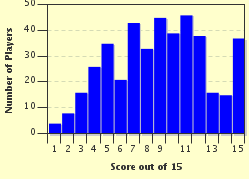Quiz Answer Key and Fun Facts
1. In 1603 the last monarch of an important European dynasty died. As there were no legal heirs, the power came into the hands of a new dynasty. In 1815 Gioachino Rossini dedicated an opera to this last monarch of this dynasty. Who was this sovereign?
2. For his 1874 opera, Modest Mussorgsky was inspired by one of Pushkin's dramas, telling the story of one of the first Czars. The Czar to which this opera refers, ruled Russia from 1598 until 1605. What was his name?
3. François-Adrien Boïeldieu completed in 1814 an opera on the French King Henry IV. The opera is given one of the nicknames of King Henry. What is this nickname, also the title of the opera?
4. In 1861, Tomasso Benvenuti named an opera after the man who is considered by many the greatest English poet and dramatist. Who is this author, who died in 1616, on April 23rd - probably his 52nd birthday?
5. Vincenzo Bellini completed in 1835 an opera named after a religious movement. The members of this religious group deplored elements of Roman Catholicism in Anglican Church. When the English government started persecuting this religious movement, some of them moved to the New World. One of the most famous boats used for this emigration was the "Mayflower". What was the name of this religious movement?
6. In 1994, the Italian composer Giorgio Battistelli named an opera "X's Traum" ("X's Dream"), where I have replaced an X for the person we're looking for. X was a German scientist (1571-1630) who proved that planets follow an elliptical course, not a circular one. Who was this German astronomer?
7. Arthur Meulemans named in 1926 an opera to a rather obscure Belgian painter. This painter lived from 1606 until 1638 and loved to depict people of the lower class (mostly male peasants) in situations typical of their entertainment: a visit to the local pub (annex brothel), a taste of tobacco, an odd fight, and so on. Who was this painter?
8. Henk Badings named in 1942 an opera after the popular nickname of a notorious painting, that carries the official title "The Militia Company of Captain Francis Banning Cocq and Lieutenant William van Ruytenburgh."
A few years before this opera, Paul von Klenau had already dedicated an opera to the Dutch artist who created the aforesaid painting. What is the popular nickname of this painting?
9. Philip Glass composed in 2002 an opera named after one of the true geniuses of the seventeenth century. The scientist who inspired Glass, was an Italian mathematician and astronomer. Who was this scientist, who is known (among other feats) for his mathematical formula on the oscillation of pendulums? His first name is almost similar to his last name.
10. The year 1899 saw the first night of an opera by Victor Herbert on a French classical author. This author inspired Edmond de Rostand to write a theatre play. Gerard Depardieu played this role in an eponymous movie. Who was this author, known for his prominent nose and for his eagerness in duelling?
11. Henry de Koven completed in 1893 an operetta entitled "The Knickerbockers". This title refers to the nickname of the first inhabitants of an American city. What is the name of this city, that changed its name in 1664?
12. Alfred Mendelsohn composed an opera named after a Dutch philosopher. This philosopher is best known for his efforts to apply the strict logic of mathematics and natural sciences to the field of sociology, ethics and so on. His masterpiece is entitled "Ethica ordine geometrica demonstrata" ("Ethics Shown in a Geometrical Way"). Who was this Dutch philosopher, who lived from 1632 until 1677?
13. An opera composed by Nicolas Isouard in 1813 was named after the great French baroque talents Jean-Baptiste Lully and Philippe Quinault. Did these two ever work together on any opera?
14. In 1926 Charles Wakefield Cadman named an opera after a person who was involved in judicial history in America in 1688-1693. What is the title of this opera?
15. Albert Lortzing completed in 1837 his opera entitled "Zar und Zimmermann". This opera derives its title to a profession Czar Peter the Great learned on his first voyage to Europe. Peter travelled incognito and spent some months in the Netherlands applying this profession. However, one would not expect the leader of one of the important nations to pick up this profession. What was this profession? Just translate the German word "Zimmermann".
Source: Author
JanIQ
This quiz was reviewed by FunTrivia editor
bloomsby before going online.
Any errors found in FunTrivia content are routinely corrected through our feedback system.

